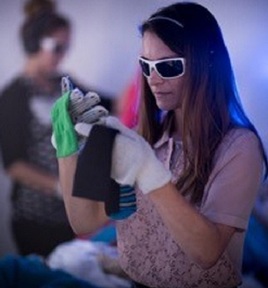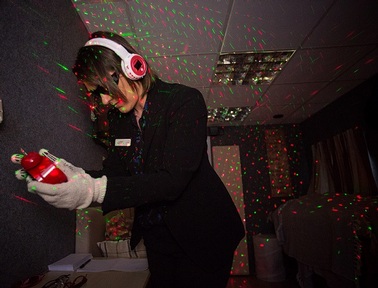What's it like to have dementia? I take a virtual tour
I’m slowly shuffling around in the semi-darkness with loud noises and voices in my ear, desperately trying to find a matching pair of socks as instructed. But it’s impossible. My sense of touch, sight and hearing have been messed with leaving me unable to do simple tasks. I’m feeling annoyed, vulnerable, bored and my feet hurt.

Welcome to the world of a person with dementia, courtesy of the mobile Virtual Dementia Tour, which is travelling the UK to give people a simulated sense of the condition.
Inside a converted van in New Malden, parked on the premises of a specialist dementia centre run by care provider the Abbeyfield Society, I’m feeling a bit anxious.
With bumpy insoles placed in my shoes, gloves on which don’t allow room for all my fingers, large headphones and dark glasses on, I enter a dark room.
Entering a dystopian disco
Red and green lights are flashing around the place. Things look hazy. I’m not walking right and the loud noises and jumbled voices around me are conjuring up the atmosphere of a not very fun disco.
Suddenly a man looms up before me whose blurry features I take time to recognise and he’s talking to me. I hear nothing. Only very loud noises of ringing phones and other background noises that startle me and make me jump. The constant, undecipherable babble of voices leave me struggling to catch his words. I’m at a loss.
Prior to starting this dementia experience, I was told there would be tasks to do and although I see a kitchen area and household items, I have no idea what is expected of me.
Seeing Red
I frustratingly pace the room and realise that’s a bit painful, like walking on small stones. I sit down. I try to write but holding a pen is tricky and I can hardly see with my new long sightedness.
I watch others in the room and try to imitate them, and when I pick up an object others do the same. It becomes a game of the blind leading the blind. Alice in a dementia wonderland but with no wonder. All the colours have literally drained out of the world except red. I pick up red objects. But they are taken away from me and this makes me rebellious and want to cling onto them to regain control of the situation.

Randomly and without warning, that man again. Human yet Cheshire cat-like, he reappears too close to my face grinning but I don’t see the joke. Others join in crowding too closely around me and suddenly I long for some solitude, silence and respite. Time drags.
Tug of war
The ‘man’ in question is Glenn Knight; managing director of Training2Care, which runs the mobile Virtual Dementia Tour. After watching other journalists fight him in a tug of war over scarves, look uncertain, hoard items and try on shirts that they can’t button up, Mr Knight offers an explanation. ‘What you’ve just experienced is stage four to six of Alzheimer’s; mid-stage dementia" he says.
He reveals the gloves and painful insoles in shoes represent peripheral neuropathy experienced by those with dementia, where the nerve endings die in their feet and hands, which leads to a lost sense of touch, pain and a shuffling walk.
Mr Knight explains colours appear dark except red because "Red is the first colour we learn in life and the last colour we lose in the spectrum of life”.
He asks “If I made you wear that equipment all day long and not let you take it off, would you call it abuse? It is abuse if staff don't change their behaviour after experiencing the tour.”
Strong words indeed. He goes on to explain: “In a care home we promote independence and choice. But it’s not their choice to be there, they’re not independent when we do so much.”
Glenn Knight, who is used to seeing how ’normal’ people behave when put in abnormal conditions, says he's seen people experience hallucinations and lose their inhibitions, something those with dementia can experience. He continues: “I’ve been hit three or four times over the tour.”
As I listened to the tour's full de-brief, I began to see why care workers may get attacked or witness ‘aggressive’ behaviour from residents with dementia because staff are getting it wrong. Personal care is one area that can create conflict.
Having felt how a person with dementia is not able to appropriately communicate what is happening to them, I wondered how ‘normal people’ would react to say the prospect of no auditory warning but the sudden realisation that someone was taking off their top, pants, item by item, but there was no word they could utter in response that would be understood by anyone.

Anti-psychotic drugs are still being prescribed to people with dementia who show 'challenging' behaviour in hospital.
This last point is a matter that infuriates P.K. Beville, the psychologist from Atlanta who created the Virtual Dementia Tour. When asked why care staff need this dementia experience, P.K. (short for Paula Kay) is clear. “People fear something they don’t understand. It’s nothing to be fearful of. It's something we can care for because there’s no magic pill on the horizon.”
In response to a leading UK dementia scientist's prediction that a cure for Alzheimer’s Disease will be here within a decade, P.K. stifles a laugh. “Do you know how many times I’ve heard that?"
Having given Training2Care the UK licence, the 62 year-old is promoting the UK's first mobile tour with a van converted to mimic dementia that is being used to educate people about the condition.
The invention stemmed from her frustration over people's inability to understand dementia. “No matter how many times I trained staff in care homes, they’d walk out of the training and do exactly the same thing that they’d done before," she says.
To simulate the condition she began, in 2000, researching every behaviour associated with every part of the brain impacted by dementia and tried to replicate it.
She explains: “I knew from the occipital lobe damage and also from the behaviour of someone with dementia that the peripheral vision is impaired so if someone approaches them from the left or the right or behind, they don’t know that they’re there even if they talk loudly and when they touch them they could be hit, scratched, bit."

But there remains limitations to the tour. Sensory deprivations are only a small part of dementia and nothing can help someone fully understand what dementia feels like; with memory loss and incontinence not simulated on the tour.
But perhaps, if not the 360 degree world, a powerful glimpse of it and the feelings it induces could be had.
In the words of one care worker describing a lady with dementia: “She is trapped in the spot of being incapable of living a very meaningful life. She feels worthless and her life is not worth living.”
At £20 a person anyone not just care workers and carers can take the tour. To do it visit www.training2care.co.uk
Latest Features News
 25-Nov-19
2019 Election: Boris Johnson leaves social care in 'too difficult box' but Labour vows to end 'crisis'
25-Nov-19
2019 Election: Boris Johnson leaves social care in 'too difficult box' but Labour vows to end 'crisis'
 18-Oct-19
Podcast: Wendy Mitchell and dementia: 'My biggest fear is not knowing who my daughters are'
18-Oct-19
Podcast: Wendy Mitchell and dementia: 'My biggest fear is not knowing who my daughters are'
 27-Sep-19
Exclusive: Care minister backs care workers' call for time off to grieve and attend funerals
27-Sep-19
Exclusive: Care minister backs care workers' call for time off to grieve and attend funerals
 19-Sep-19
Podcast: Gyles Brandreth says poetry helps ward off dementia
19-Sep-19
Podcast: Gyles Brandreth says poetry helps ward off dementia
 30-Aug-19
Edinburgh Fringe funnyman joins comics facing toughest audience at care home gig
30-Aug-19
Edinburgh Fringe funnyman joins comics facing toughest audience at care home gig